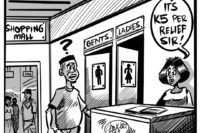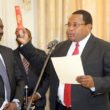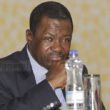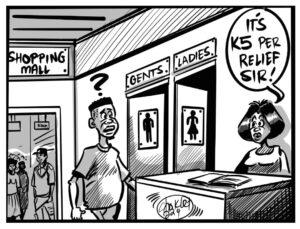Last week, News Diggers published an exposé that accused the Permanent Secretary of the Ministry of Water Development, Sanitation and Environmental Protection, Edward Chomba, of misleading the nation about his academic achievements. Chomba, who was first appointed to his position by President Edgar Lungu in November 2015 before he was kept in the role after the 2016 elections, had hitherto claimed that he holds two doctorate degrees from Oxford and Princeton universities. The two institutions have since dismissed Chomba’s assertions, explaining, upon inquiry, that they have no records of Chomba studying there. When confronted with this information, Chomba, who also describes himself as a Bishop, insisted that he was a graduate of both universities, confidently asserting “my learning institutions will never disclose any information to anybody without my consent. They will never do that. They will get consent from me. There is no person who is gonna go and try to get my information and they communicate without letting me know as an alumni.”
Chomba’s antics provoke a number of important questions that we should be interrogating as a society. Before discussing the wider ramifications of this case, however, it is important to consider Chomba’s assertion that Oxford and Princeton would never give out any information relating to whether or not a person attended the two institutions because they respect principles of anonymity. This argument is blatantly false and reveals Chomba’s limited legal knowledge and understanding of how genuine universities function. There is no principle of anonymity for basic facts about enrolment and graduation that govern universities, let alone the University of Oxford or Princeton. If Chomba had attended Oxford, for instance, he would know that the details of graduates are printed in the annual public records of the university showing the degree qualification obtained, the name of the Oxford college at which the graduating student studied and the candidate’s name. This Oxford tradition predates Chomba’s birth. The ‘highly educated’ Permanent Secretary obviously does not know this, since he neither attended nor graduated from Oxford. If he had, Chomba would have also known that the award of a doctorate at Oxford is preceded by the successful submission of a thesis that is subsequently accessible both in print and online through the university libraries and to which there is no anonymity in relation to the details of the author, the Oxford college they attended, and when they completed. No such records exist in Chomba’s case.
Most importantly, Chomba’s falsified academic qualifications and his subsequent response to the revelations that he is a cheat have wider implications.
First, they raise serious questions about the criteria on which Permanent Secretaries are appointed and the constitutionality of Chomba’s appointment. Article 184 of the Constitution, which provides for the appointment and functions of Permanent Secretaries, stipulates that “The President shall, on the advice of the Civil Service Commission, appoint a Permanent Secretary for a Province, ministry or department.” This means that the Civil Service Commission is responsible, at least on paper, for regulating recruitment to the civil service and ensuring that appointments are done on merit, adhere to the highest standards of professional ethics and integrity, and promote the values of honesty, objectivity and impartiality. However, the Constitution also places a similar obligation on the President. Article 259 (1) (a) states that “Where a person is empowered to make a nomination or an appointment to a public office, that person shall ensure that the person being nominated or appointed has the requisite qualification to discharge the functions of the office, as prescribed or specified in public office circulars or establishment registers’.
When the two cited clauses are read together, they suggest that both the Commission and President Lungu may have violated the Constitution by neglecting to carry out their legally assigned functions. What advice did the Commission give to President Lungu in relation to Chomba’s appointment as Permanent Secretary? Or perhaps the Commission was never consulted in the first place? Similarly, what ‘requisite qualification to discharge the functions of the office’ of Permanent Secretary did Lungu see or consider before he appointed Chomba to that position? Was it his supposed two doctorates that have turned out to be fabricated? Or perhaps both the Commission and the President disregarded the law for political expediency? It is worth remembering that Chomba came to national prominence in the run-up to the 2015 presidential election when he accused opposition United Party for National Development leader Hakainde Hichilema of being a Satanist and freemason. Unless evidence to the contrary is provided, it would not be unreasonable to conclude that it is that disparaging remark that earned Chomba his appointment to the coveted post following Lungu’s election.
Permanent Secretary is the highest technocratic position and the most important in any ministry because its holder is the overall head and controlling authority responsible, among other things, for advising the relevant minister and implementing the policies of government and the decisions of Cabinet. The effective execution of such duties requires competent, experienced and qualified professionals, not unqualified political cadres. It would therefore be important to get clarification from State House, Secretary to Cabinet Roland Msiska or the Civil Service Commission on how exactly Permanent Secretary Chomba was appointed and what considerations were taken into account.
Second, Chomba’s case embodies the worst tendencies in contemporary Zambia or what is messed up about this country: the culture of lying. Such is the magnitude of this problem across the social strata that even men of God, a consecrated Bishop for that matter, are now perpetrators or culprits. Chomba knows what he is doing and is aware that it is wrong both legally and morally. Yet he does it all the same because it is profitable to lie. His deliberate decision to fabricate his higher record of education suggests that he is embarrassed about his possibly low level of formal education and is attempting to cover it up. The man of God’s flimsy explanation for why Oxford and Princeton would deny that he was their student points to his total disregard for the truth. The absolute confidence with which Chomba attempted to cover up his fabrications even after he was clearly exposed suggests that he is such a self-deluded and compulsive liar that he now believes, as a matter of conviction, his own lie that he successfully completed two doctorates at Oxford and Princeton, and gets aggrieved when anyone questions his illusions. If Chomba had any shred of decency, he would apologise to the people he misled, resign and embark on a period of quiet contemplation, out of the public eye.
I however imagine that Chomba does not care that he has been caught lying because he is confident that there will be no sanctions for his fraudulent behaviour. He knows that we are a society that rewards mediocrity, liars, cheats, criminals and people of questionable character. He is, in this case, simply our leader par excellence or symptomatic of a wider problem: a people that has become accustomed to lies and whose public leaders are consequently never called to account because they reflect our actual flaws or behaviour. Those with integrity, who abhor corruption, are principled and seek achievement or upward mobility through meritocracy, are derided and frowned upon. This damaging attitude accounts for the growing and frightening levels of mediocrity, corruption and the incompetence that permeate public institutions, including the civil service.
What I am curious about is when and why people like Bishop Chomba started lying about their qualifications and grand lies for that matter? What informed his choice of Oxford and Princeton? Is it because they are elitist and top ranked institutions? What kind of credibility was Chomba trying to gain? When he started fabricating his educational credentials, whenever that was, who was he trying to con? It would appear that by peddling the kind of degraded and ingratiating Christianity that has become a norm in Zambia – that of status, power, money and privilege rather than of humility and service to others – Bishop Chomba, like many other snake oil salesmen, must have reasoned or decided that he had to distinguish himself from the other charlatans. Why our society has been accepting and even celebratory of these obvious tales requires in-depth examination.
I call on President Lungu to maintain some standard of honesty in his government by asking Chomba to produce certificates of his alleged doctoral qualifications – and if he cannot, dismiss him. If it is established that Chomba has fake academic certificates, then he has potentially committed a criminal offense for which he is liable to prosecution under section 352 of the penal code, which deals with uttering false documents or obtaining pecuniary advantage by false pretences. The rest of us should learn from this shameful example of a supposed man of God: that instead of lying or exaggerating our academic qualifications to obtain a job or any other favour, we should strive to legitimately obtain required academic qualifications and create a climate where real achievements are valued more highly than invented ones. We must also lobby Parliament to enact legislation that criminalises the falsification of one’s academic credentials.
Third, Chomba’s lies underscore the need for the government to audit the educational qualifications of workers in the public sector and to sack and prosecute those found wanting. For a long time, we have complained about the ineffectiveness and poor performance of the civil service. Chomba’s ludicrous fabrications about his academic qualifications, which go beyond a case of dishonesty and an-out-of control ego, point to a possible root cause and raise the question: who else is lying and at what level? For Chomba, he has used these fictional qualifications to claim a prestigious job in the public service, one that is very crucial to the effective functioning of any ministry. It is outrageous that we have suitably qualified and well educated Zambians out of work when a shameless fraud like Chomba occupies such a prominent position with possibly better skilled and genuinely educated professionals serving under his command.
The sad reality, however, is that Chomba is not the only one. Although his case is perhaps the most blatant example of inflating one’s educational qualifications, he is potentially emblematic of tens of thousands of Zambians who have obtained jobs in the formal sector, jobs that are few and far between, using non-existent or fake academic qualifications. When ill-qualified and dishonest individuals obtain jobs that they cannot competently perform over legitimately qualified fellow nationals, it is Zambia as a whole that suffers, underlining the need to run proper checks on the qualifications of all employees and take decisive action against those found cheating genuine learners and employers.
For any feedback, please email [email protected]












